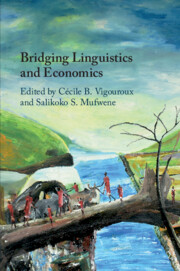Book contents
- Bridging Linguistics and Economics
- Bridging Linguistics and Economics
- Copyright page
- Contents
- Figures
- Tables
- Contributors
- Preface
- 1 Do Linguists Need Economics and Economists Linguistics?
- 2 Economists Do Need Linguists
- 3 The Invisibility of Linguistic Diversity Online
- 4 Evaluating Language Policy and Planning
- 5 The Economics of Language Diversity and Language Resilience in the Balkans
- 6 Determinants of Bilingualism among Children
- 7 Economy and Language in Africa
- 8 The Unequal Exchange of Texts in the World Language System
- 9 Language Economics and Language Rights
- Author Index
- Subject Index
- References
3 - The Invisibility of Linguistic Diversity Online
Reflections on the Political Economy of Digital Communication
Published online by Cambridge University Press: 02 March 2020
- Bridging Linguistics and Economics
- Bridging Linguistics and Economics
- Copyright page
- Contents
- Figures
- Tables
- Contributors
- Preface
- 1 Do Linguists Need Economics and Economists Linguistics?
- 2 Economists Do Need Linguists
- 3 The Invisibility of Linguistic Diversity Online
- 4 Evaluating Language Policy and Planning
- 5 The Economics of Language Diversity and Language Resilience in the Balkans
- 6 Determinants of Bilingualism among Children
- 7 Economy and Language in Africa
- 8 The Unequal Exchange of Texts in the World Language System
- 9 Language Economics and Language Rights
- Author Index
- Subject Index
- References
Summary
This chapter takes at its starting point a theoretical perspective that links language, signs, and sign-making firmly to the material world, and the inequalities that shape this world. The visibility, and invisibly, of linguistic diversity online is a function of these larger socioeconomic processes, and the digital social inequalities they give rise to. The internet and associated networking applications might be “new” technologies, but they reflect and reproduce historical continuities of structural inequality, reinforcing the imbalances, silences, and marginalizations that define the global world system.
- Type
- Chapter
- Information
- Bridging Linguistics and Economics , pp. 81 - 108Publisher: Cambridge University PressPrint publication year: 2020
References
- 1
- Cited by



